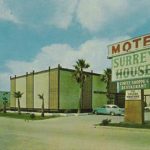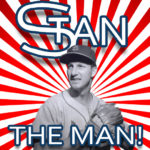CHAPTER 5
Postgame Highlights
It was approximately 6:30 pm on Sunday, September 29, 1963. I had just recently returned to my room at the Surrey House Motor Hotel, a quaint and comfortable but less-than-luxurious accommodation provided by the Houston Colt .45s Baseball Organization.  The final game of the 1963 season ended a few hours earlier. We had beaten the New York Mets, 13–4. It was the only game that year that the Colts had scored in double figures. I was particularly happy because I had the good fortune to play in my first Major-League baseball game. I did pretty well. I was up five times. I got three hits (all singles). I got three RBI and scored four times. I also walked twice. I made a few plays in the outfield without an error. It was exciting and fun! I was eighteen years old!
The final game of the 1963 season ended a few hours earlier. We had beaten the New York Mets, 13–4. It was the only game that year that the Colts had scored in double figures. I was particularly happy because I had the good fortune to play in my first Major-League baseball game. I did pretty well. I was up five times. I got three hits (all singles). I got three RBI and scored four times. I also walked twice. I made a few plays in the outfield without an error. It was exciting and fun! I was eighteen years old!
After I turned on the TV to watch the sports news, I ordered dinner from the hotel room service. My usual order was normally a couple of steaks or a few large cheeseburgers, with baked potatoes or fries, and maybe a salad. A large, thick malted milkshake was a customary drink, along with a Pepsi or Coke. While waiting for my dinner to arrive, Guy Savage came on the TV broadcast to deliver the news in sports. Almost immediately, he reiterated the game highlights, proclaiming the Colts’ greatest victory in the season’s finale. The two cellar dwellers were battling in “last place.” But the .45s were just too overpowering for the New York Mets, overwhelming their hapless opponents 13–4.
“It was the first time this season that the Colt .45s were able to get into double figures, thanks, in large part, to the extraordinary performance of young rookie outfielder, John Paciorek.”
(I couldn’t remember any special, congratulatory fanfare given to me by fellow players anytime after the game, either in the clubhouse or during transportation back to the Surrey House with those who were also staying there—just the traditional, obligatory “Nice game” salutation and “See you at spring training.” So I didn’t think my performance bore any great significance to any immediate or future reflection on the game.)
When my name was mentioned with such enthusiasm, my mouth gaped open while chill bumps circulated over my body. I felt an enormous sense of pride as well
as wonderment and awe about the way he described my seemingly auspicious accomplishment. He reminded me and other TV viewers that I had ended the 1963 season with a “perfect” batting average, 1.000. My on-base percentage was also 1.000, for five at bats. I drove in three runs. And I scored four times. And my fielding percentage was also 1.000, flawless in four opportunities. In concluding his commentary, Mr. Savage noted that he, as well as the entire Colt .45 Organization, was looking forward to the brilliant future that was surely in store for this phenomenal rookie and for the Organization itself.
My food had arrived, but I barely heard the knock by the room service attendant. So many joyous thoughts raced in my mind, along with nebulous feelings of uncertainty. I awakened from my “dream state” by the sound at the door.
As I signed for the food tab, I heard Guy mention, “In other sports news, Stan Musial announced his retirement after twenty-two years in the big leagues. He ended his career on the high note of another two-hit performance.”
I thought it odd that my performance (by an eighteen-year-old rookie) would receive greater press coverage than Stan “The Man” Musial. (I later found out that on the national level, Stan got the fuller coverage while my performance on most broadcasts didn’t receive any mention at all.)
Nothing could normally disrupt my mealtime regimen, especially when two medium—well, Porterhouse—steaks were waiting to be devoured. And it wasn’t! But I couldn’t exactly give my undivided attention to the scrumptious delicacies on the coffee table in front of me when one other pressing issue lay before me.
How in this world was I going to live up to this exaggerated moment of glory? It was thrust into my experience during one game in which I really wasn’t even prescheduled to play. And an even more “mind-bending” dilemma was predicated on whether or not my back would allow me to sustain another season, or even another day, of performing on a baseball field. My standard for play was 100 percent or nothing. If I couldn’t be 100 percent, how could I play to my maximum efficiency?
(Although frantic thoughts seemed evident on the surface, deep within me I did harbor hope and reason to believe and expect that I would be able to play again. It seemed that I was born to play!)
It was my first taste of “professional fan adulation,” and I liked the way it made me feel, even for the moment. Countless thoughts were randomly being processed through my brain, but in a manner so haphazard that I could find no consolation from ideas trying to address them. Yeah! I was a good athlete, and I always felt that I belonged in the “big leagues.” But with my limited professional experience, I hadn’t given any solid evidence that I belonged. Sure, I just went 3 for 3, three RBI, scored four runs, and walked twice, but I did not tear the cover off the ball. In fact, I felt that I was pretty lucky. Every circumstance provided me with opportunities the other players would have hoped for. I just happened to be the one with the “magic wand.” I couldn’t help but feel that someone or something must have been choreographing my “excellent day.”
“How could I do what I did and not make a single mistake? Perfect!”
In the morning, I had picked up the paper (Houston Post) at the Surrey House before my taxi took me to the doctor’s office. After I found the sports section, the front page boasted a headline that proclaimed a tremendous victory for the Colts that reissued a last-place finish for the Mets. There were lots of pictures— picture of me rounding third-base, with a caption, “John Paciorek scoring one of his four runs in the Colts’ romp over the hapless New Yorkers.” 
The bumpy traveling conditions prevented me from reading, so it wasn’t until I arrived at the doctor’s office that I perused the article. The writer elaborated on the details of my first-game exploits and ended the article with the not-so-obvious conclusion that conferred upon John Paciorek “the unofficial Major-League batting title.” While in the waiting room, a current New York Times newspaper was left on the table, and I found the following statements in one of the sports articles: “Paciorek found nothing difficult about the majors,” and “He doesn’t yet know what it’s like to make an out in the big leagues.”
The Organization had arranged flights home for all the players, and my plane was leaving for Detroit from Houston’s Hobby Airport at 10:00 am on Tuesday, September 31. This would be my final checkup by the doctors. Some of us were going home for the winter, for rest and “self-evaluation,” while others would again be going to fall—“Instructional Ball,” like I did the previous year.
At the last moment, the Organization asked if I would like to go to a fall league in Florida and play on a team that had Colt .45 players as well as players from the Boston Red Sox. I half-wondered why “they” asked me to go, but I told them I would love it. The doctors said that perhaps I wouldn’t need an operation if I could strengthen my abdominal and back muscles enough to stabilize the lumbar area of my (lower) back. So of course, I intended to follow the prescribed exercise program for strengthening those muscles in my own particularly over-ambitious manner. But would that be enough?
Next: Chapter 6 – Home: Sweet – Home?